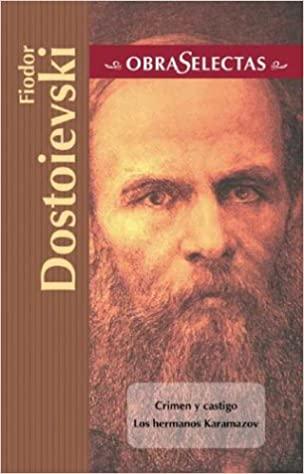FIODOR DOSTOIEVSKI, from a a z
El escritor David Foster Wallace afirmaba que “hay un arte por el que vale la pena hacer un poco de trabajo extra para superar todo lo que obstaculiza su apreciación, y está claro que los libros de Dostoievski bien valen ese trabajo".
This need to focus in depth the work of Fiodor Dostoevski (Moscow, 1821 - San Petersburg, 1881), makes more sense when the 200th anniversary of his birth is celebrated.
The opportunity opens with a waterfall of publications that dissect their literature.These include the reissue by the Rafael Cansinos Assens Foundation (ark) of its complete and updated complete works (18 volumes in total) with the parties that censorship erased after the civil war.The effort of tired Assens, an intellectual expurited from the silver age of Spanish culture, was titanic since it translated from Spanish to Russian all Dostoevski in 1935.
It is only a flash of fascination with this tormented, fierce genius, compulsive player, a convinced philosopher and humanist, which continues to appeal to us.Next, an approach to Dostoevski from A to Z.
Agnosticism
The existence of God, the immortality of the soul or free will were ambitious moral perspectives that go through flesh, soul and writing to the author.It is known that his original idea was to write a single monumental novel entitled Atheism.
It never happened but the religious and metaphysical drives impregnated all their work with a deep philosophical stacked in the subsoil's memoirs.He anticipates in the Karamázov brothers Nietzsche's idea that God does not exist, then everything is allowed.
Beauty
The novelist claimed that one could not live without beauty and contemplate the splendor of Rafael's Madonna constituted his personal therapy.
The concept of Dostoevski is that of a beauty with a shared ethical dimension in pain.A feature that he finds even in the most perverse souls.The opposite will not be ugliness but utilitarianism: the spirit of stealing from others dignity, for this reason, provided that it prevails with love "beauty will save the world" as Acuña in the idiot.
Crime and Punishment
One of his masterpieces halfway between the essay and the false police novel.The depth burden emerges by raising if every crime has a punishment.The novelist raises moral decomposition through the young Rodión Ramanovich that justifies the crime of a person in his delectable judgment as a means of salvation.The work consists of six parts plus an epilogue and as a curiosity it resorts to numerous words and polysemy games.
The novel is based on the personal experiences of Dostoevski imprisoned in Siberia for four years.There he lived with criminals, whose behavior was brutal but with flashes of nobility.The impacted was capital and the writer returned again and again on this trauma.
Double
The double was his second book published.The plot is simple: an arrival official comes into contact with a man identical to him, at first they will make friendship although they will end up being enemies in a diabolical game that also slides the class struggle.
The argument is interesting for its multiplied springs: anticipates the foundations of the psychological novel, of which Dostoevski is considered a father, in the tortured interior dialogues of its protagonist.It attacks with humor and some perversity a recurring theme in universal literature: the confrontation with our other self.
Epilepsy
Dostoevski suffers his first epileptic crisis with twelve years and the disease will mark him for life in several ways.With 18 years he has a severe attack when his father, a despotic and alcoholic doctor, at the hands of his servants being killed.The writer always wanted his death and drags the guilt.
Pathology is omnipresent.The author links her to magical thinking, uses her as an argument to get rid of military service and gives her body in several of her characters.In the Karamázov brothers he introduces us to Smerdiákov, a bastard son who works as a servant and pretends epileptic crises.Dostoevski had the ability to connect his children's traumas with the fluctuations of Russian society.
Freud
The admiration of the father of psychoanalysis by the Russian author was unwavering.Freud described the Karamázov brothers as "the most magnificent novel ever written" and achievement of universal literature.It was not right.
Sigmund Freud advances one step further and dissects the enigma of his spirit as a material of an incipient psychiatry.He dedicates several essays such as Dostoevski and Parricide (1928) in which he works his theory of neurosis in the formation of the unconscious or the Oedipus complex.
"In the rich personality of Dostoevski we can distinguish four facets: the poet, the neurotic, the moralist and the sinner.How to guide ourselves in this intricate complication? "Freud points out.
Grigorievna, Anna

Anna Grigorievna Dostoyevskaya was the writer's second wife.Key figure in the sentimental, literary and economical, they met when she exercised as a stenographer in the writing by the player.After finishing the job they married.
Anna saved the writer from game debts and himself.He even committed his own clothes to help him of the creditors, while both lived in Germany, towards the end of the 1860s.Subsequently, she became her editor and successfully channeled her legacy recovering copyright and reflating family finances (they had four children).After the death of her husband, Anna Grigorievna says: "My husband has died, but in my hands is the care of her work and her story".
Fate
Explore the theme of destiny, but or fate through a call to experience in the present and action.Another flash of Avant Garde.His is the famous phrase: "We were making our plans, but we forgot that fate also has plans".
“We must value it as the writer who does the great analysis of the human mind, faces us to the day -to -day dilemmas.A very obvious issue is the issue of the evil of the human being but at the same time there is great hope.The final conclusion is that there is a possibility of redemption, "says Arca Editor Rafael Cansinos, son of the biographer and translator Tired Assens.
Injustice
Poor people (1846) was Dostoevski's prima opera.Described by critics as the first social novel and received with enthusiasm.His predilection for people who suffered difficulties, for their "humiliated and offended", forms a universal lesson of humanism.
Dostoevski always fought against social injustice, advocated improving the living conditions of the workers, declared himself a pacifist, sympathized with feminism and applauded the abolition of servitude.
Player
Ludopata confessed, Dostoevski fell victim of game addiction during a stay in a Germany spa as he writes by letter to his brother."In Wiesbaden I invented a game of my game; I applied it and I immediately won 10.000 Franks.The next morning, exalted, I changed the system and lost.At night I returned to my system again, following it rigorously, and soon I won again 3.000 Franks.Tell me, how was possible, after this, not get excited? ".
In the player he recounts his miseries to the roulette where he lost everything several times and accumulated millionaire debts.It is perhaps the novel that has best shown the dementia of Ludopathy.
Karamázov
Acclaimed as one of the summits of universal literature, brings together all the ingredients of mastery as a philosophical text that addresses high moral issues as doubts about the existence of God.
The Karamázov brothers was the latest novel by the Russian writer, published in 1880.A family drama that Dostoevski spent almost two years writing and that appeared by chapters in the newspaper El Messejero Russian.The author died four months after he came to light.
The literary revolution was also sealed with a new anticipation: it introduces a modern salad of literary techniques such as the ominecient narrator or assigns each character a specific way of speaking in a constant dance of dialogues, comings and goings.Advance one step further and at certain points, the novel departs from the plot to penetrate the history and personality of other secondary characters.Pure genius.
Freedom of the press
In his journalistic facet he wrote hundreds of articles, many of them censored, and was a firm defender of press freedom and founder of several publications."Our folletinistas sign all with pseudonyms.Is it possible that their names contain something so valuable, that it is necessary to hide them so carefully about shame? ".
The origin of a writer's daily work is in his collaboration in the magazine El Ciudadano in 1873, a project that the writer gained periodically until, in 1876, he became an independent magazine in which he would light articles "mainly journalistic with total with totalLibertad "and became one of the few authors with" ability to interfere with public and political opinion ", on many occasions through the satire of power.
Modernity
"Fiódor Mijáilovich only wrote about eternal issues.He called them the cursed problems of man, the problems of consciousness.Did not get carried away by the fashions of the moment.Created for eternity, "their biographers point out about their update outside the trends.A glory that shares with classics like Cervantes or Shakespeare.
Essential works such as crime and punishment is forced reading in many schools although it offers adults the possibility of rediscovering an unexplored universe.Dostoevski is still the most read Russian writer and almost 400.000 copies of his work are published annually in his native country.
Novel
Good, evil, crime, desire.The writer is considered the father of the psychological and existential novel for the ability to transfer to literary language the inner conflict of humans, in which he submerged without prejudice.
He always rejected the yoke of labels."They call me psychologist: it's a lie, I'm just realistic in a high sense, that is, I represent all the depth of the human soul".
Even Friedrich Nietzsche that almost always remitted against the Alabó: "Dostoevski, the only psychologist who can learn something, has been one of the happiest accidents in my life".
Orthodox
His conversion to orthodox Christianity occurred during his confinement in Siberia.During this ordeal his only reading were the gospels that he was dedicated to reading the prisoners.He led to embrace the faith and dogma of salvation through suffering.
From his point of view, only the Orthodox Church remained faithful to the teachings of Christ and the Russian people had to follow their guidelines.He should also obey the Tsar, father of the nation and head of the empire.
A verse from San Juan is engraved on its tombstone: “In truth, I really tell you that if the wheat grain falls on the earth, it does not die, it is left alone;But if he dies produces a lot of fruit."
Characters
His characters are extreme and tensioning for suffering in a warmoscope of souls as rich as representative of a stark realism. “Pocas veces encontramos un autor que desprecie y aborrezca a sus personajes de un modo tan virulento como Dostoievski", analizan los especialistas.
From Rodion Románovich the murderer who avoids justice in crime and punishment to Prince Lev Nikoláyevich Myshkin of the idiot who represents the absolute goodness in beauty.The character palette is impressive, although the evil one by definition is the protagonist of the subsoil's memoirs."I'm a sick man...A bad man. No soy agradable", avisa a navegantes.A miserable being in the figure of the perfect antihero, a trace of the darkness that the Russian author printed on his creatures.
Complain
The complaint was a constant in his life, because of his economic problems and his addictions, his family situation or about the turbulence that shook the changing socio -political context of the 19th century Russia.There was another type of lament that is more shook to the feeling than to its literary universe, that of the mystery of romantic love.The writer married twice but lived a sudden and stormy arrow of a young woman who would soon abandon him.
“Es al separarse cuando se siente y se comprende la fuerza con que se ama" o “es difícil juzgar la belleza: la belleza es un enigma".These are the phrases distilled by the novelist between bitterness and nostalgia.They seal a love enigma that he never gave up in his efforts to hurry life with intensity.
Ruin
Economic precariousness accompanied him for much of his life and had a direct reflection in the execution of his work.
Tightened by debts, he accepted commission translations as Eugenia Grandet, from Balzac, with a salary well below that of the market. Él mismo se definía como “proletario de la escritura" y firmó contratos leoninos que le obligaban a producir a destajo.
This speed was reflected in numerous grammatical errors, even spelling, in his novels.These oversights were censored by Hemingway himself: “I have asked about Dostoevski. ¿Cómo un hombre puede escribir tan mal, tan increíblemente mal, y hacerte sentir de manera tan profunda?".Despite the Dardo was another of his confess followers.
Subconscious
His work Memories of the subsoil is valued as the first existential novel, but before the author had explored the theme of the subconscious in the dream of a ridiculous man, a story that first appeared in a writer's daily.
The narrator begins the story by presenting himself as a ridiculous and lonely man, whose absurd situation arises from the conviction that existence is meaningless.That places it in a position of negative nihilism, to the point of coming to affirm that everything is indifferent and that things are nothing more than appearances, so that it never existed or there will be nothing more than depending on himself.
Torment
“Pocos grandes escritores de la literatura moderna han sufrido tan súbitos y dramáticos cambios de fortuna, tanto en su vida personal como en su carrera literaria, como Fiódor Mijáilovich Dostoievski", afirman sus biógrafos.
The attacks started with the death of their mother at age 16, who sow in their mood spirituality and at the same time the hedonistic attachment for life, suffering in Siberia finishes the revolutionary and emerges to the writer who embraces Christianity without fissure.1864 was a tragic year since he lost his first wife because of tuberculosis, his brother Mikhail also died, whom he was very close to.The next metamorphosis will be economical: it is ruined by his love for the game but he knows the success at 40 with a writer's diary.Alcoholism, emotional ups and downs and depression truffled their years of life.
Universal
If Tolstoy, Author of War and Peace, is considered the Russian writer par excellence, Dostoevski, who was a great admirer of El Quijote is "a universal writer".It continues impertérrito as the best selling in Russia and its brightness does not go out although nuanced by its multiple heirs.
"It becomes an essential writer.Not only for those who want to devote to literature but for any reader interested in novel.Being such a clear antecedent of Freud this places him full today. Le vamos a tener presente durante los próximos siglos", señala Rafael Cansinos que recomienda su relectura para espigar joyas escondidas.
Visionary
With a fine smell he knew how to predict the geopolitical earthquakes of his time.In his novel the demons (1872) anticipates 45 years in advance that Russia would be the first communist country, an argument that Marx and Engels ruled out as there was no industrial proletariat in the country.
Demons is an allegory of the potentially catastrophic consequences of political and moral nihilism that were becoming predominant in Russia in the 1860s.A fiction city descends to chaos when it becomes the center of attention of a revolutionary attempt, orchestrated by a conspiracy teacher.Thus the argument starts.
William Shakespeare
The writer valued himself as a disciple of Shakespeare.He admired the author of Romeo and Julieta above the rest of the writers and inherited the combination of drama and humor in his works.
In turn, the Russian exerted an essential influence on multiple geniuses that have declared their reverence towards the human, social and even mathematic. Se convierte en el novelista favorito de Einstein que afirmó que “Dostoievski me da más que ningún científico". Un círculo virtuoso que Virginia Wolf cierra con este halago: “Aparte de Shakespeare, no hay lectura más emocionante que Dostoievski".
Xenophobia
The writer was a staunch defender of the Russian national identity and his popular traditions in speeches that frish xenophobia.The patriotic message is recurring following his trips through Europe at the end of his life where his country lace in numerous articles.
"We believe that the Russian nation constitutes an extraordinary phenomenon in the history of humanity.The character of the Russian people is so different from that of current European peoples that Europeans have not understood or understand it backwards, "he says. Y repite constante: “Europa no entiende a Rusia" aunque no usa el argumento para demonizar Occidente.
Juxtaposition
Dostoevski began being revolutionary and fluctuated criticism of socialism and individualism in a constitution of constant ideas.In the final part of his life he openly defended the Tsarist monarchy, orthodox faith and the idea of "bribosot" or spiritual community.
The novelist opposes communism against individualism."The communists, by liquidating the property, want total well -being and by expropriation they want to limit the vicious will of the people.But I need precisely my vicious will and all means at their disposal to be able to give up them ".
Czar
Tsar Nicolás I was the culprit of one of the most devastating episodes of its existence.With 20 years Dostoevski joined a group of intellectuals followers of utopian socialism who were arrested for conspiring against the leader.
The Czar demonstrated his power with a punishment of extreme cruelty: the simulated execution.In 1849 with a careful staging, the author and his companions were tied to posts and pointed with weapons.Until the last minute they thought they were going to die.Finally, he was commuted to four years of forced labor in Siberia.The Austrian writer Stefan Zweig recovered the history of execution that did not take place in his book star moments of humanity.







